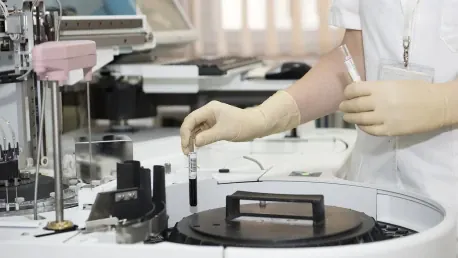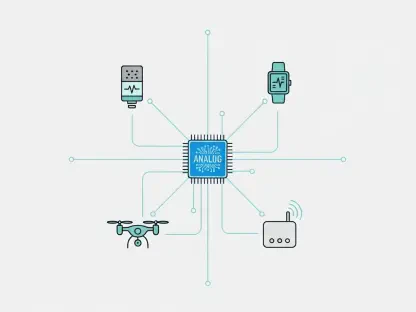Artificial intelligence (AI) is transforming medical diagnostics, particularly in the fields of radiology and oncology, fundamentally altering how diseases like cancer are diagnosed and treated. One groundbreaking development in this sphere is the AI tool designed by IDIBAPS-Hospital Clínic Barcelona specifically for diagnosing prostate cancer. This AI system, developed under the INCISIVE project, leverages an extensive dataset comprising 3.7 million medical images from over 9,000 patients. By doing so, it significantly enhances diagnostic accuracy while democratizing patient care across various demographics.
The Growing AI Oncology Market
Market Projections and Drivers
The AI oncology market is forecasted to experience substantial growth, with projections estimating it will reach approximately $9 billion by 2029. This expected expansion is driven by AI’s remarkable efficiency in analyzing medical imaging and patient data, facilitating the early diagnosis of cancer and the implementation of personalized treatment plans. Across the healthcare sector, stakeholders are advised to closely monitor this trend to capitalize on the burgeoning market opportunities, as early investment in AI technologies may yield significant returns and improve patient outcomes.
The ability of AI to analyze complex medical data quickly and accurately is transforming oncology by enabling more precise and timely cancer diagnoses. Early detection increases the likelihood of successful treatment and long-term remission, making it a crucial development in cancer care. The market’s anticipated growth also reflects broader healthcare trends favoring personalized medicine, which tailors treatments to individual patient characteristics, enhancing efficacy and reducing adverse effects. As AI continues to integrate into medical diagnostics and treatment plans, its influence on the oncology market will only become more pronounced.
Importance of Data Quality and Diversity
The efficiency and effectiveness of AI models are significantly dependent on the quality and diversity of the data they are trained on. In this context, research led by Francesco Rizzetto from the University of Milan focused on AI tools for detecting pneumothorax, revealing notable limitations. These AI tools encountered challenges when analyzing images taken from non-ideal patient positions or emergency scenarios, emphasizing the necessity for diverse and robust training datasets to capture the complexities of varied real-world conditions accurately.
To improve AI diagnostic accuracy across different patient populations and conditions, it is imperative to incorporate a wide range of data into training sets. Such diversity ensures the AI models can generalize well and perform accurately outside controlled clinical environments. This approach necessitates ongoing collection and integration of multimodal medical data, which includes different imaging techniques, demographic information, and clinical scenarios. By advancing the quality and breadth of training datasets, healthcare providers can bolster AI’s reliability in diagnosing and treating cancer under varied circumstances.
Enhancing Treatment Protocols with AI
Advanced Molecular Diagnostic Assays
Beyond its impact on diagnostics, AI technologies are also improving treatment protocols through the development of advanced molecular diagnostic assays. Companies like Biofidelity and Labcorp are at the forefront of leveraging AI to create innovative solutions in this realm. Biofidelity’s Aspyre Lung Reagents facilitate the genomic profiling of both tissue and liquid biopsies in cases of non-small cell lung carcinoma. This advancement not only enhances accessibility but also reduces the cost of cancer testing, making it more affordable for a broader range of patients.
The use of AI in developing molecular diagnostic assays promises to revolutionize cancer treatment by allowing for more precise and personalized approaches. These assays can identify specific genetic mutations and biomarkers associated with different types of cancer, enabling oncologists to tailor therapies to individual patients’ needs. The result is more effective treatments with fewer side effects, as well as the potential for better patient outcomes. AI’s ability to analyze large datasets quickly and identify patterns that human clinicians might miss is key to these improvements, driving innovation in cancer care.
Liquid Biopsy Technologies
Similarly, Labcorp’s PGDx Elio Plasma Focus Dx kitted assay, which has received FDA authorization, profiles solid tumor mutations through liquid biopsy. This significant advancement demonstrates AI’s capability to streamline diagnostic processes and inform precise treatment decisions. Liquid biopsies, which are less invasive than traditional tissue biopsies, allow for continuous monitoring of tumor evolution and treatment response. Consequently, the introduction of AI-enhanced liquid biopsy technologies marks a critical step forward in making cancer care more accessible and effective for patients worldwide.
AI-powered liquid biopsy technologies present numerous benefits, including more frequent monitoring of cancer progression and therapy effectiveness, reduced patient discomfort, and the potential for earlier detection of recurrence. By analyzing circulating tumor DNA in a patient’s blood, these technologies can provide real-time insights into how cancer is evolving, facilitating timely adjustments to treatment plans. This proactive approach can lead to better patient outcomes and increased survival rates. The continued development and integration of AI in molecular diagnostics and liquid biopsy technologies underline a transformative shift towards more efficient and patient-friendly cancer care.
International Collaboration in AI-Driven Medical Solutions
The INCISIVE Project
The article emphasizes the critical role of international collaboration in advancing AI-driven medical solutions. The Europe-based INCISIVE project serves as a prime example of such collaborative initiatives, involving 26 partners from countries like Belgium, Italy, and the UK. By integrating extensive multimodal patient data and images, this project aims to develop effective screening and treatment options for various cancer types. The collaborative effort underscores the importance of pooling resources, expertise, and data to accelerate the development and implementation of innovative AI solutions in healthcare.
International collaborations like the INCISIVE project are instrumental in overcoming the limitations of localized data and resources. By bringing together a diverse array of partners, these initiatives can leverage a wider range of expertise and datasets, enhancing the robustness and applicability of AI models across different populations and healthcare systems. Moreover, such collaborations foster the exchange of knowledge and best practices, facilitating the standardization and dissemination of AI-driven medical solutions on a global scale. Ultimately, these efforts contribute to more effective and equitable healthcare delivery worldwide.
Benefits of Collaborative Efforts
The benefits of international collaboration in developing AI-driven medical solutions extend beyond the immediate technological advancements. Such efforts are crucial for refining patient care pathways, resolving diagnostic ambiguities, and establishing benchmarks for quality treatment delivery. By working together, healthcare providers, researchers, and technologists can address the complex challenges associated with cancer diagnosis and treatment more effectively. These collaborations ensure that AI-driven solutions are both effective and widely accessible, ultimately enhancing the overall healthcare framework and patient outcomes.
International partnerships enable a more comprehensive approach to tackling cancer, combining the strengths of different healthcare systems and research institutions. This collective approach can lead to the development of more sophisticated AI models, capable of addressing a broad spectrum of diagnostic scenarios and patient needs. Additionally, collaborative efforts promote the standardization of AI technology, facilitating its adoption across diverse healthcare settings. By fostering a culture of cooperation and shared knowledge, international collaborations pave the way for more innovative and impactful advancements in cancer care, ensuring that AI-driven solutions benefit patients worldwide.
The Role of AI in Personalized Medicine
Market Growth and Regional Leadership
The introduction of AI models has generated significant optimism within the field of oncology, with the market’s projected growth underscoring the increasing emphasis on personalized medicine. Personalized medicine, which tailors treatment plans to individual patient characteristics, is poised to benefit immensely from AI’s capabilities. In this context, North America is expected to lead the charge due to its advanced healthcare infrastructure. The region’s robust research and development ecosystem, coupled with substantial investment in AI technologies, positions it to capitalize on these advancements, ultimately improving survival rates and fostering innovation across the healthcare sector.
The focus on personalized medicine represents a paradigm shift in how cancer is treated, moving away from one-size-fits-all approaches toward more individualized care strategies. AI’s ability to analyze large volumes of patient data, including genetic information, lifestyle factors, and treatment histories, enables the identification of tailored therapies that are more likely to be effective for specific patients. This approach not only enhances treatment outcomes but also minimizes the risk of adverse effects, improving the overall patient experience. As AI continues to evolve, its role in personalized medicine will likely expand, driving further advancements in cancer care.
Operational Efficiencies and Cost Minimization
AI’s impact in healthcare extends significantly beyond diagnostics, offering a myriad of tools for enhancing operational efficiencies and minimizing costs. By automating routine tasks and streamlining workflows, AI can reduce the administrative burden on healthcare providers, allowing them to focus more on patient care. Additionally, AI systems can optimize resource allocation, ensuring that healthcare facilities operate more efficiently. Despite these advantages, the article notes the critical importance of standardizing AI technology to refine healthcare delivery. Variations in AI adoption across institutions highlight the need for increased knowledge sharing and the dissemination of best practices to maximize outcomes.
The adoption of AI in healthcare operations holds the potential to transform how medical facilities function, leading to more efficient and cost-effective care delivery. Automated systems can handle tasks such as scheduling, billing, and inventory management, reducing the time and effort required for these activities. Moreover, AI can assist in clinical decision-making, providing healthcare professionals with valuable insights to inform their diagnosis and treatment plans. To fully realize these benefits, it is essential to standardize AI technologies and promote widespread adoption, ensuring that all healthcare institutions can leverage these tools to enhance patient care and operational efficiency.
The Future of AI in Cancer Management
Revolutionizing Diagnosis and Treatment
The evolution of AI in medicine heralds a promising future, with the technology set to play an integral role in cancer management strategies and beyond. By revolutionizing diagnosis, treatment, and overall patient care, AI offers the potential to significantly improve outcomes for cancer patients. The article underscores the importance of collaboration between medical, technological, and regulatory fields in bringing sophisticated AI systems from concept to practice. Such interdisciplinary efforts are vital for addressing the complex challenges associated with cancer care and ensuring that AI-driven solutions are both effective and widely adopted.
As AI continues to advance, its applications in cancer management will likely expand, offering new opportunities for early detection, precise treatment, and continuous monitoring of disease progression. These capabilities can lead to more successful treatment outcomes and improved quality of life for cancer patients. Collaborative efforts between various stakeholders are essential for harnessing the full potential of AI, as they facilitate the development and implementation of innovative solutions that can transform the cancer care landscape. By working together, the medical and technological communities can drive significant progress in the fight against cancer.
Enhancing Patient Outcomes
Artificial intelligence (AI) is revolutionizing medical diagnostics, particularly in radiology and oncology, dramatically changing how diseases like cancer are identified and managed. One innovative advancement in this realm is an AI tool developed by IDIBAPS-Hospital Clínic Barcelona for diagnosing prostate cancer. This cutting-edge AI system is part of the INCISIVE project and uses a vast dataset of 3.7 million medical images from over 9,000 patients. The integration of this extensive data allows the AI to significantly improve diagnostic accuracy. Moreover, it plays a crucial role in democratizing patient care, making high-quality diagnostics more accessible across different demographics. By leveraging such advanced technology, healthcare professionals can diagnose prostate cancer with higher precision, ensuring timely and effective treatment. This system exemplifies how AI can bridge gaps in healthcare, providing equitable, high-standard diagnostic services to a broader population and paving the way for future advancements in medical diagnostics.









